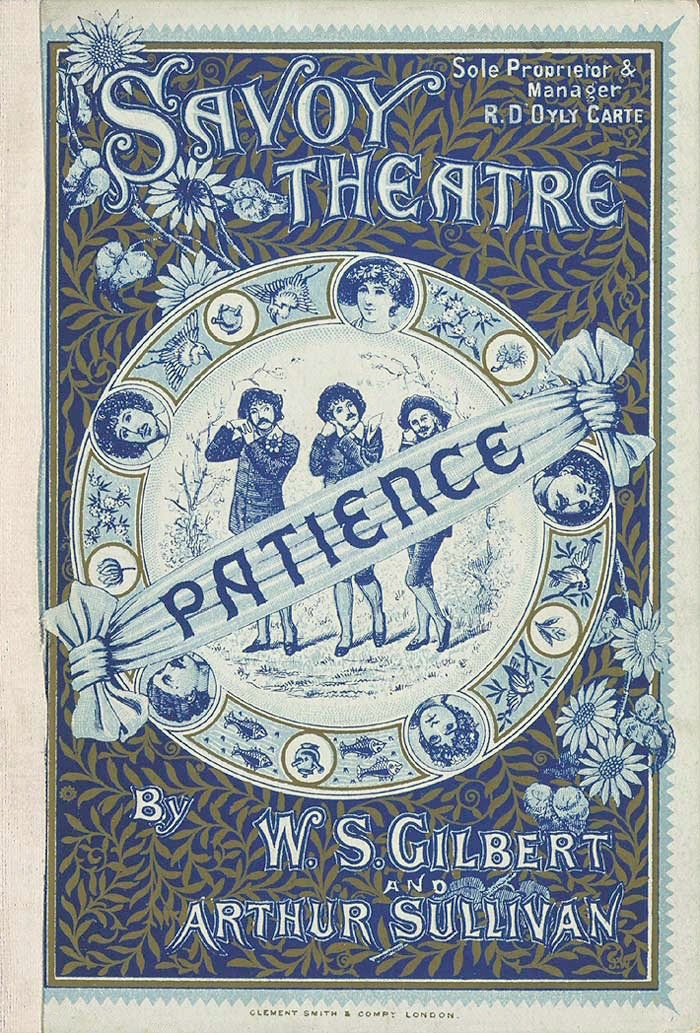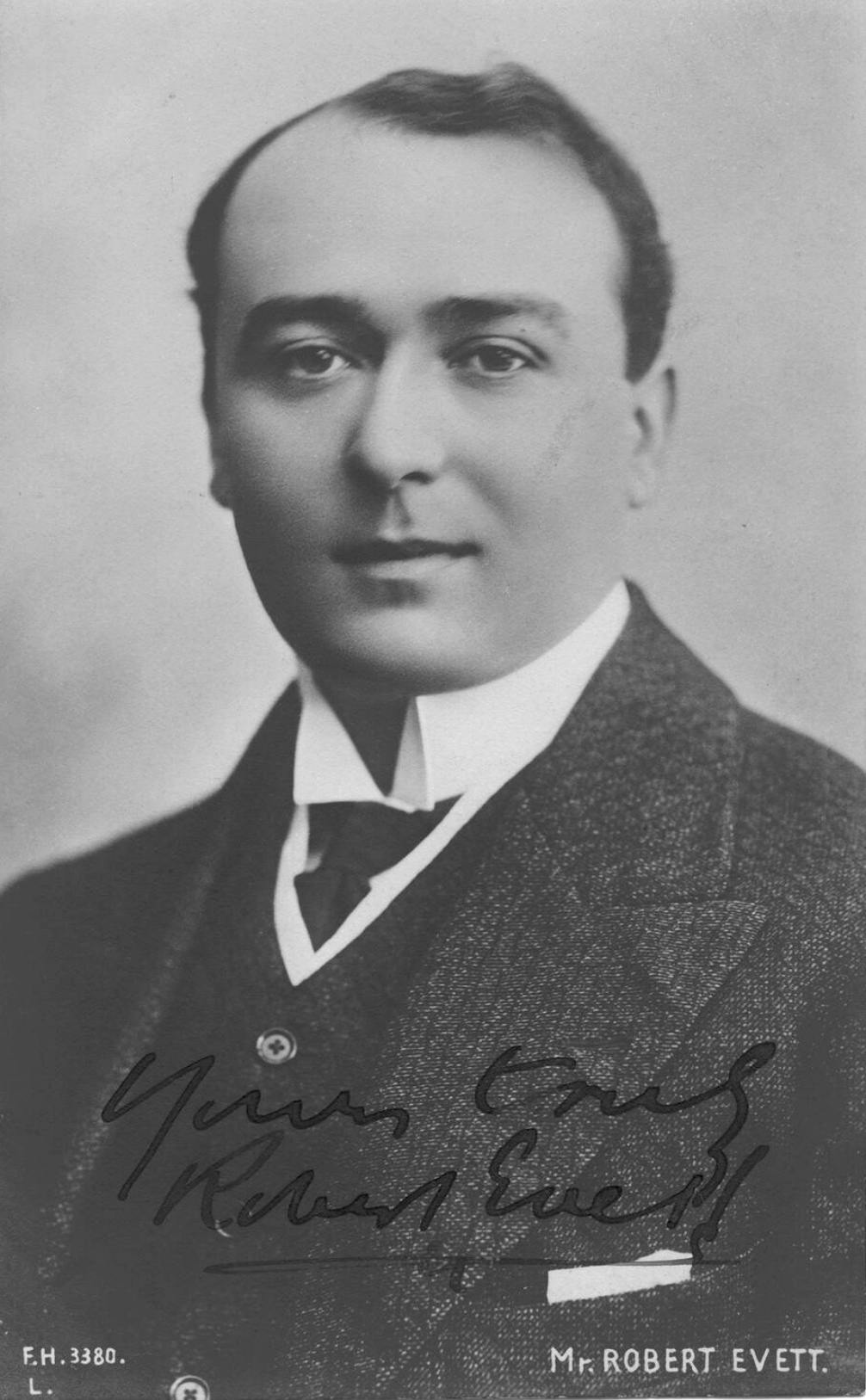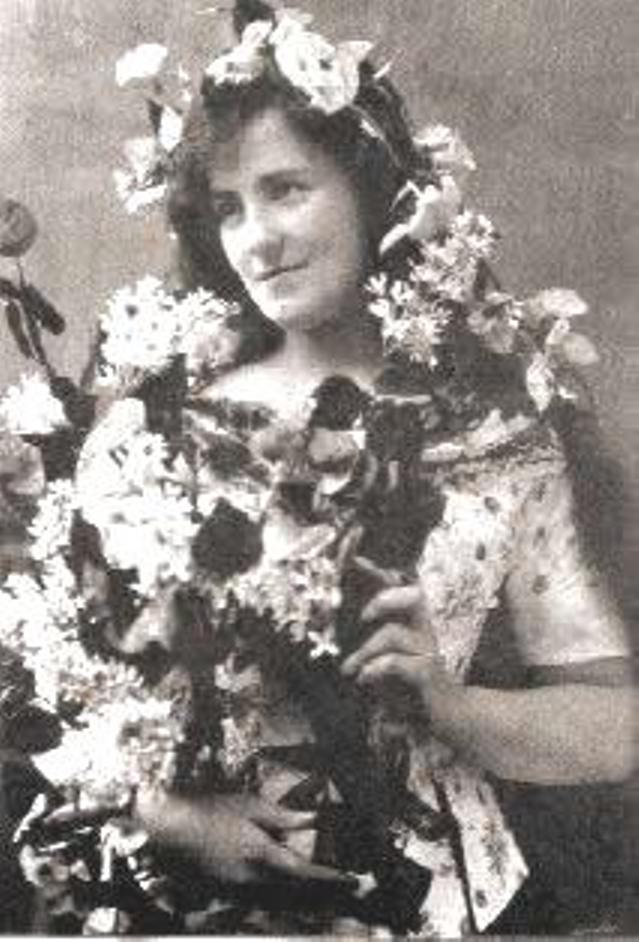|
Pretty Polly (opera)
''Pretty Polly'' is a one-act playlet by Basil Hood, with music composed by François Cellier. The ten-minute long piece concerns the difficulties of a shy fellow who tries to use a talking parrot as a matrimonial agent. The piece was first produced at the Theatre Royal, Colchester, 26 April 1900, and then at the Savoy Theatre, from 19 May 1900 to 28 June 1900 as a companion piece to Hood and Sir Arthur Sullivan's ''The Rose of Persia'', a run of 26 performances. It then played from 8 December 1900 to 20 April 1901, together with the first revival of Gilbert and Sullivan's 1881 hit, ''Patience'', a run of 102 performances. No printed libretto or vocal score is found in British Library, although the licence copy of the libretto is there. The music appears to have been added for the Savoy Theatre production, as it is not indicated in the licence copy. Background When the Gilbert and Sullivan partnership disbanded after the production of ''The Gondoliers'' in 1889, impresario Rich ... [...More Info...] [...Related Items...] OR: [Wikipedia] [Google] [Baidu] |
Basil Hood
Basil Willett Charles Hood (5 April 1864 – 7 August 1917) was a British dramatist and lyricist, perhaps best known for writing the libretti of half a dozen Savoy Operas and for his English adaptations of operettas, including ''The Merry Widow''. He embarked on a career in the British Army, rising to the rank of captain, while writing theatrical pieces in his spare time. After some modest success, Hood and his collaborator, the composer Walter Slaughter, had a major hit with their long-running show, ''Gentleman Joe'', in 1895. Another long-running success was ''The French Maid'' (1896). Hood then resigned from the army to pursue his career as a librettist full-time. With Arthur Sullivan and then Edward German, he wrote several well-received pieces for the Savoy Theatre, including ''The Rose of Persia'' (1899), ''The Emerald Isle'' (1901), ''Merrie England (opera), Merrie England'' (1902) and ''A Princess of Kensington'' (1903). After comic opera went out of fashion, Hood tur ... [...More Info...] [...Related Items...] OR: [Wikipedia] [Google] [Baidu] |
Savoy Opera
Savoy opera was a style of comic opera that developed in Victorian England in the late 19th century, with W. S. Gilbert and Arthur Sullivan as the original and most successful practitioners. The name is derived from the Savoy Theatre, which impresario Richard D'Oyly Carte built to house the Gilbert and Sullivan pieces, and later those by other composer–librettist teams. The great bulk of the non-G&S Savoy Operas either failed to achieve a foothold in the standard repertory, or have faded over the years, leaving the term "Savoy Opera" as practically synonymous with Gilbert and Sullivan. The Savoy operas (in both senses) were seminal influences on the creation of the modern musical. Gilbert, Sullivan, Carte and other Victorian era British composers, librettists and producers, as well as the contemporary British press and literature, called works of this kind "comic operas" to distinguish their content and style from that of the often risqué continental European operettas t ... [...More Info...] [...Related Items...] OR: [Wikipedia] [Google] [Baidu] |
Operas
Opera is a form of theatre in which music is a fundamental component and dramatic roles are taken by singers. Such a "work" (the literal translation of the Italian word "opera") is typically a collaboration between a composer and a librettist and incorporates a number of the performing arts, such as acting, scenery, costume, and sometimes dance or ballet. The performance is typically given in an opera house, accompanied by an orchestra or smaller musical ensemble, which since the early 19th century has been led by a conductor. Although musical theatre is closely related to opera, the two are considered to be distinct from one another. Opera is a key part of the Western classical music tradition. Originally understood as an entirely sung piece, in contrast to a play with songs, opera has come to include numerous genres, including some that include spoken dialogue such as '' Singspiel'' and ''Opéra comique''. In traditional number opera, singers employ two style ... [...More Info...] [...Related Items...] OR: [Wikipedia] [Google] [Baidu] |
English Comic Operas
English usually refers to: * English language * English people English may also refer to: Peoples, culture, and language * ''English'', an adjective for something of, from, or related to England ** English national identity, an identity and common culture ** English language in England, a variant of the English language spoken in England * English languages (other) * English studies, the study of English language and literature * ''English'', an Amish term for non-Amish, regardless of ethnicity Individuals * English (surname), a list of notable people with the surname ''English'' * People with the given name ** English McConnell (1882–1928), Irish footballer ** English Fisher (1928–2011), American boxing coach ** English Gardner (b. 1992), American track and field sprinter Places United States * English, Indiana, a town * English, Kentucky, an unincorporated community * English, Brazoria County, Texas, an unincorporated community ... [...More Info...] [...Related Items...] OR: [Wikipedia] [Google] [Baidu] |
English-language Operas
English is a West Germanic languages, West Germanic language of the Indo-European language family, with its earliest forms spoken by the inhabitants of early medieval England. It is named after the Angles, one of the ancient Germanic peoples that migrated to the island of Great Britain. Existing on a dialect continuum with Scots language, Scots, and then closest related to the Low German, Low Saxon and Frisian languages, English is Genetic relationship (linguistics), genealogically West Germanic language, West Germanic. However, its vocabulary is also distinctively influenced by Langues d'oïl, dialects of France (about List of English words of French origin, 29% of Modern English words) and Latin (also about 29%), plus some grammar and a small amount of core vocabulary influenced by Old Norse (a North Germanic language). Speakers of English are called Anglophones. The earliest forms of English, collectively known as Old English, evolved from a group of West Germanic (Ingvae ... [...More Info...] [...Related Items...] OR: [Wikipedia] [Google] [Baidu] |
Robert Evett
Robert Evett (16 October 1874 – 15 January 1949) was an English singer, actor, theatre manager and producer. He was best known as a leading man in Edwardian musical comedies and later managed the George Edwardes theatrical empire. In 1892, at age 18, Evett joined the D'Oyly Carte Opera Company on tour in leading tenor roles. Six years later, he was starring in the company's London cast at the Savoy Theatre, where he stayed until the company left the Savoy in 1903. He soon began to appear in Edwardian musicals in the West End, first in ''The Earl and the Girl'' (1903). He continued to star in musicals and operettas for the next decade, including in '' The Little Michus'' (1905), ''The Merry Widow'' (1907), '' A Waltz Dream'' (1908) and ''The Girl in the Train'' (1910). In 1913 and 1914, he performed on Broadway. He also lent his voice to early acoustic recordings of songs. Upon the death of the famous producer George Edwardes in 1915, Evett returned to England; there he b ... [...More Info...] [...Related Items...] OR: [Wikipedia] [Google] [Baidu] |
Louie Pounds
Louisa Emma Amelia "Louie" Pounds (12 February 1872 – 6 September 1970) was an English singer and actress, known for her performances in musical comedies and in mezzo-soprano roles with the D'Oyly Carte Opera Company. Originally intended for a secretarial career, Pounds joined the chorus of a George Edwardes show in 1890 and quickly achieved advancement to leading roles in burlesque and musical comedy. In 1899, she joined the D'Oyly Carte company, where she created several roles. She was the youngest of five siblings who appeared with D'Oyly Carte. Her older brother Courtice was a principal tenor with the company in the 1880s and '90s, and her three sisters, Lily, Nancy and Rosy, also appeared with the company. After four years with D'Oyly Carte, Pounds resumed her career in musical comedies and non-musical plays, later switching from juvenile to character parts. Her career continued into the 1930s. Life and career Early days Pounds was born in Brompton, Kensington, Lon ... [...More Info...] [...Related Items...] OR: [Wikipedia] [Google] [Baidu] |
Henry Lytton
Sir Henry Lytton (born Henry Alfred Jones; 3 January 1865 – 15 August 1936) was an English actor and singer who was the leading exponent of the starring comic patter- baritone roles in Gilbert and Sullivan operas from 1909 to 1934. He also starred in musical comedies. His career with the D'Oyly Carte Opera Company spanned 50 years, and he is the only performer ever knighted for achievements in Gilbert and Sullivan roles. Lytton was born in London; he studied there with a painter but then went on the stage in defiance of his family's wishes. At the age of 19 he married Louie Henri, an actress and singer who helped him gain a place in a D'Oyly Carte touring company in 1884. After briefly playing in other companies, he and his wife rejoined D'Oyly Carte. He had an early breakthrough in 1887 when the Savoy Theatre star George Grossmith fell ill, and the 22-year-old Lytton went on for him in ''Ruddigore''. Lytton starred in D'Oyly Carte touring companies from 1887 to 1897, playing ... [...More Info...] [...Related Items...] OR: [Wikipedia] [Google] [Baidu] |
Queen Victoria
Victoria (Alexandrina Victoria; 24 May 1819 – 22 January 1901) was Queen of the United Kingdom of Great Britain and Ireland from 20 June 1837 until her death in 1901. Her reign of 63 years and 216 days was longer than that of any previous British monarch and is known as the Victorian era. It was a period of industrial, political, scientific, and military change within the United Kingdom, and was marked by a great expansion of the British Empire. In 1876, the British Parliament voted to grant her the additional title of Empress of India. Victoria was the daughter of Prince Edward, Duke of Kent and Strathearn (the fourth son of King George III), and Princess Victoria of Saxe-Coburg-Saalfeld. After the deaths of her father and grandfather in 1820, she was raised under close supervision by her mother and her comptroller, John Conroy. She inherited the throne aged 18 after her father's three elder brothers died without surviving legitimate issue. Victoria, a constitu ... [...More Info...] [...Related Items...] OR: [Wikipedia] [Google] [Baidu] |
The Pall Mall Gazette
''The Pall Mall Gazette'' was an evening newspaper founded in London on 7 February 1865 by George Murray Smith; its first editor was Frederick Greenwood. In 1921, '' The Globe'' merged into ''The Pall Mall Gazette'', which itself was absorbed into '' The Evening Standard'' in 1923. Beginning late in 1868, at least through the 1880s, a selection or digest of its contents was published as the weekly '' Pall Mall Budget''. History ''The Pall Mall Gazette'' took the name of a fictional newspaper conceived by W. M. Thackeray. Pall Mall is a street in London where many gentlemen's clubs are located, hence Thackeray's description of this imaginary newspaper in his novel '' The History of Pendennis'' (1848–1850): We address ourselves to the higher circles of society: we care not to disown it—''The Pall Mall Gazette'' is written by gentlemen for gentlemen; its conductors speak to the classes in which they live and were born. The field-preacher has his journal, the radical free-t ... [...More Info...] [...Related Items...] OR: [Wikipedia] [Google] [Baidu] |
Curtain Raiser (drama)
A curtain raiser is a short performance, stage act, show, actor or performer that opens a show for the main attraction. The term is derived from the act of raising the stage curtain. The first person on stage has "raised the curtain". The fashion in the late Victorian era and Edwardian era was to present long evenings in the theatre, and so full-length pieces were often presented together with, usually shorter, companion pieces. Each full-length work was normally accompanied by one or two short companion pieces. If the piece began the performance, it was called a curtain raiser. One that followed the full-length piece was called an afterpiece An afterpiece is a short, usually humorous one-act playlet or musical work following the main attraction, the full-length play, and concluding the theatrical evening.p24 "The Chambers Dictionary"Edinburgh, Chambers,2003 This short comedy, farce, o .... W. J. MacQueen-Pope commented, concerning the curtain raisers: :This was a one-act ... [...More Info...] [...Related Items...] OR: [Wikipedia] [Google] [Baidu] |
Victorian Era
In the history of the United Kingdom and the British Empire, the Victorian era was the period of Queen Victoria's reign, from 20 June 1837 until her death on 22 January 1901. The era followed the Georgian period and preceded the Edwardian period, and its later half overlaps with the first part of the ''Belle Époque'' era of Continental Europe. There was a strong religious drive for higher moral standards led by the nonconformist churches, such as the Methodists and the evangelical wing of the established Church of England. Ideologically, the Victorian era witnessed resistance to the rationalism that defined the Georgian period, and an increasing turn towards romanticism and even mysticism in religion, social values, and arts. This era saw a staggering amount of technological innovations that proved key to Britain's power and prosperity. Doctors started moving away from tradition and mysticism towards a science-based approach; medicine advanced thanks to the adopti ... [...More Info...] [...Related Items...] OR: [Wikipedia] [Google] [Baidu] |







